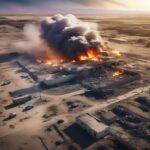Recent airstrikes carried out by the U.S. on February 2nd in Iraq and Syria have stirred discussions about the escalating tensions in the Middle East. The U.S. Central Command reported that the airstrikes aimed at Iran’s Islamic Revolutionary Guards Corps (IRGC) Quds Force and their “affiliated militia groups.” These targeted strikes, involving U.S. aircraft, including long-range bombers from stateside bases, hit more than 85 locations. The targeted sites included command-and-control operations centers, intelligence centers, rockets, missiles, unmanned aerial vehicle storages, and logistics and munition supply chain facilities.
Background: A Response to Drone Attack
The airstrikes followed a drone attack on a Jordanian base that resulted in the deaths of three U.S. soldiers. While stopping short of directly targeting Iran, President Joe Biden issued a statement emphasizing that the military response would continue “at times and places of our choosing.”
Perspectives on the Military Response
Retired Air Force Major General Mick McGuire expressed his thoughts on the recent military response. Maj. Gen. McGuire, in response to the strikes, conveyed disappointment, stating, “It’s unfortunate that it’s gotten to this point.” He connected the strikes to the recent losses of servicemen and injuries to Arizona guardsmen in Jordan.
Maj. Gen. McGuire acknowledged the necessity of ensuring everyone’s safety but also expressed hope that the airstrikes would act as a deterrent, reducing the frequency and intensity of violence against U.S. servicemembers overseas.
Concerns about Protracted Engagements
Highlighting his concerns, Maj. Gen. McGuire pointed out a recurring cycle, stating that the military engagement might not see a swift resolution. He emphasized the importance of a clearly defined objective for the military in any theater, expressing skepticism about the effectiveness of protracted engagements without such clarity.
Maj. Gen. McGuire noted that, as a member of the military, he has consistently advocated against engagements without a well-defined purpose. He emphasized the risk of getting bogged down in prolonged conflicts, suggesting that without clear objectives, military operations could become perpetual and lack meaningful progress.
The Justifiability of U.S. Counterstrikes
Maj. Gen. McGuire defended the U.S. right to strike back, asserting that it is appropriate when the country needs to defend itself. He underlined the importance of safeguarding national security and responding to threats against U.S. interests.
The Ongoing Cycle of Military Engagement
Despite the hope for deterrence, Maj. Gen. McGuire’s concerns about the potential for prolonged engagements without clear objectives raise questions about the future trajectory of U.S. military involvement in the Middle East. The recent airstrikes, while addressing immediate threats, underscore the challenges of navigating complex geopolitical tensions and the need for a strategic approach to achieve lasting stability in the region.









Leave a Reply